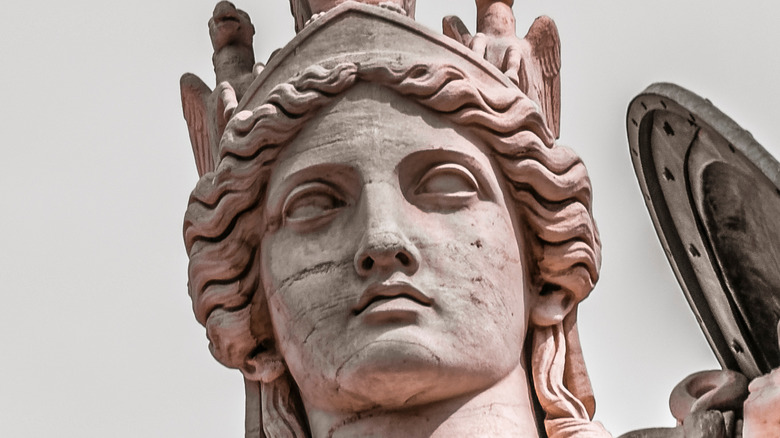The Roman Goddess Who Inspired Minerva McGonagall
We may receive a commission on purchases made from links.
Minerva McGonagall is an iconic fixture of the Harry Potter universe. The intimidating Transfiguration professor is known both for her fiercely demanding coursework as well as her intense loyalty and dedication to Hogwarts and its students. From the first moment Harry spots her at Hogwarts, he is intimidated, describing her as "a tall, black-haired witch in emerald-green robes" with a "very stern face," per Mugglenet.
From the beginning of the story, McGonagall is the one to lay down the law of the land. She is very firmly dedicated to justice and fairness, punishing her students when necessary and supporting them whenever forces of evil threaten.
Many of the characters, spells, and magical creatures in Harry Potter are inspired by old myths and folktales, per the BBC, and McGonagall is no exception. Her wise, capable, and powerful character draws inspiration from the Roman goddess Minerva, whose Greek counterpart is the iconic Athena.
Who was the Roman goddess Minerva?
Minerva is known as the wisest of the Roman deities, per Mythopedia, and her specialties include intelligence, craftsmanship, and philosophy. She shares a creation story with her Greek counterpart Athena, as both were said to have sprung fully formed from the head of Zeus (in the Greek myths) or Jupiter (in the Roman stories), clad in armor and prepared to go to battle.
Like Athena, Minerva is often also described as a goddess of war, and she was most frequently worshiped during times of war and crisis in Rome, per The Collector. Fittingly, in the Harry Potter series, McGonagall is a formidable force of nature during the war against Voldemort that erupts in the final books.
In Roman mythology, Minerva is frequently associated with both the olive branch and the owl. In many myths, she is depicted as a goddess with a fiercely competitive side as well as a dedication to justice and chastity.
Myths and stories about Minerva the goddess
One of the more popular myths featuring Minerva depicts a competition between her and the weaver Arachne, which appears in Ovid's "Metamorphosis." Annoyed by Arachne's claims about her own weaving talent, Minerva challenges Arachne to a weaving competition, which the goddess loses. Out of spite and angered at Arachne's disrespect, she turns Arachne into a large spider, according to History Today.
In another myth, also crafted by Ovid, the beautiful Medusa is violated by Neptune in Minerva's own temple. Enraged, Minerva turns the maiden's hair into a cluster of snakes, per Mythology Source. When Perseus finally slays Medusa, he brings her head to Minerva, who then carries it when she goes into battle.
While Professor Minerva McGonagall is not quite as vengeful and cruel as the Minerva of some myths, the two certainly both value purity, justice, rule-following, and good behavior, and they are both certainly willing to go to battle for the things they love.


